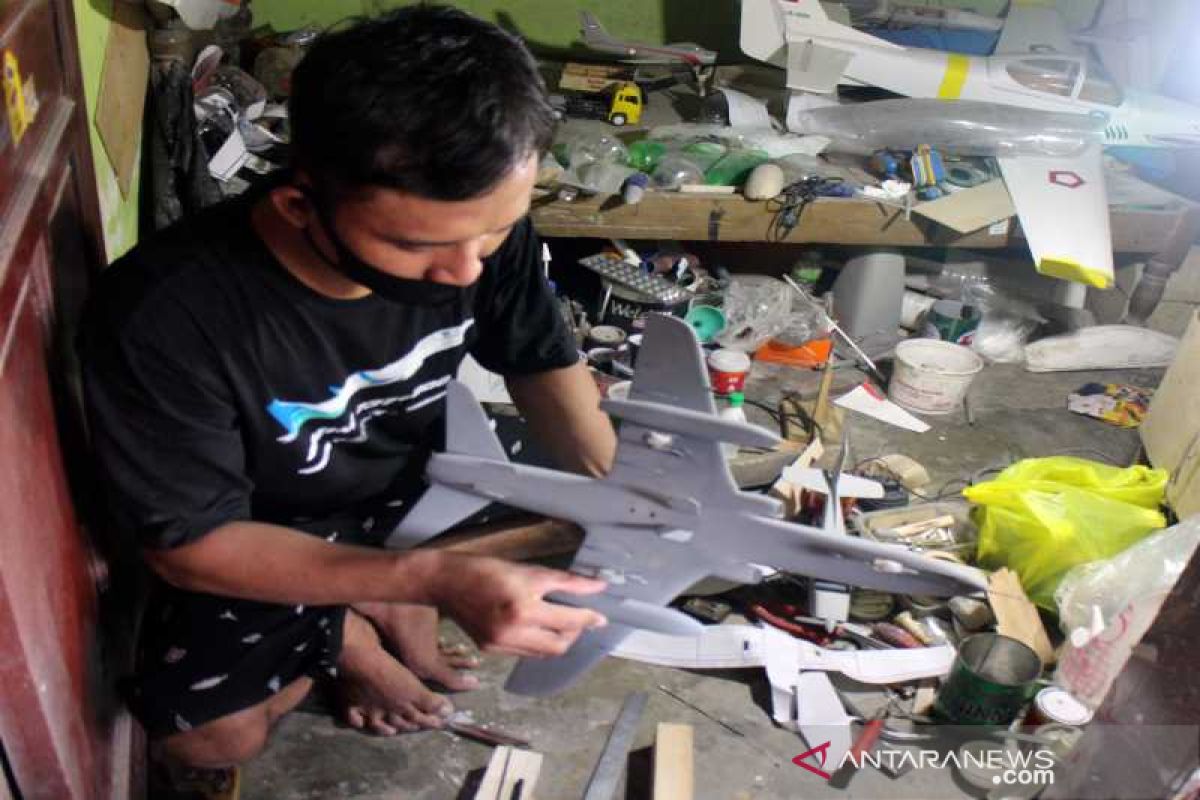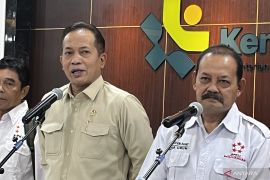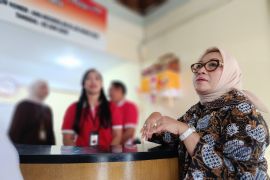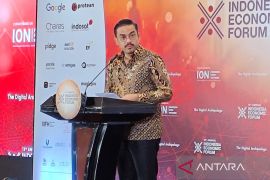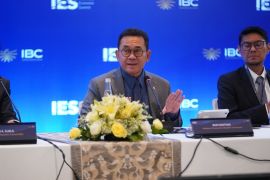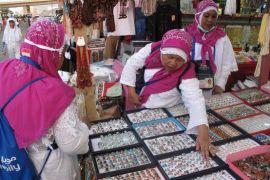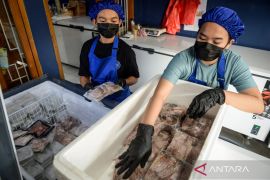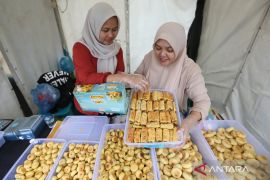Some 99 percent of the businesses in Indonesia are dominated by MSMEs, which absorb 97 percent of the total number of workers, but MSMEs only contribute 57 percent to the national GDPJakarta (ANTARA) - Indonesia’s 64.2 million micro, small, and medium scale enterprises (MSMEs) have contributed Rp8,573.89 trillion, or 61.07 percent, to its GDP (gross domestic product) as of March, 2021, as per data from the Cooperatives and Small Medium Enterprises (SMEs) Ministry.
MSMEs absorb 97 percent of the national work force, account for 60.4 percent of the total investment, and contribute 14.37 percent to export growth, data has shown.
Given their contribution, Coordinating Minister for Economic Affairs, Airlangga Hartarto, has called MSMEs critical pillars of the Indonesian economy.
National Development Planning Minister/National Development Planning Agency (Bappenas) head Suharso Monoarfa, however, wants MSMEs to play a broader role in boosting Indonesia’s economy.
"Some 99 percent of the businesses in Indonesia are dominated by MSMEs, which absorb 97 percent of the total number of workers, but MSMEs only contribute 57 percent to the national GDP," Monoarfa stated on May 26, 2021.
Despite various MSME development programs being conducted by ministries and state institutions, the results have yet to be optimal, he observed.
The minister drew attention to an evaluation of MSME programs from January, 2020 that pointed to moral hazards existing in the capital grants offered by ministries and state institutions to MSMEs.
"This is since it (a grant) does not have to be returned and utilized for non-business related purposes," he explained.
The National Development Planning Ministry/Bappenas, the Ministry of Finance, the SME and Cooperatives Ministry, and other concerned ministries and institutions will evaluate MSME development programs as a basis for budget allocation in 2022, he said.
He suggested that the role of the SME and Cooperatives Ministry, as the coordinator of the MSME development programs, be bolstered. Companies partnering with MSMEs should receive incentives, he added.
Related news: Minister seeks greater role of MSMEs in boosting Indonesia's economy Indeed, a great number of MSMEs in Indonesia are still facing several challenges.
A survey of 195,099 MSMEs conducted by the Cooperative, Small and Medium-Scale Enterprises Ministry has found that 23.10 percent of MSMEs have experienced a decline in their business turnover, 19.50 percent have encountered obstacles in distribution, and 19.45 percent have faced problems obtaining working capital.
An Asian Development Bank (ADB) survey has presented similar findings, revealing 30.5 percent of Indonesian MSMEs have recorded a decline in domestic demand and 48.6 percent have been temporarily closed.
"One of the government's moves to revive MSME economic activity is providing stimulus in working capital through the micro loans (KUR) scheme with low interest rate and without additional collateral," Minister Hartarto revealed.
In 2020, the government had waived interest payments and deferred principal installments of KUR for MSMEs affected by the COVID-19 outbreak for a maximum of six months.
It had also established super micro KUR targeting laid-off workers and the micro-scale home industry.
In 2021, the government has extended the provision of an interest subsidy of three percent, postponement of principal installments, and relaxation of KUR provisions by extending its term as well as increasing the ceiling to Rp253 trillion.
"The government will need the help of all stakeholders, including the public and MSME operators, to ensure that all government policies have been implemented properly. Thus, the MSMEs could strengthen their businesses and boost the national economy," Hartarto said.
The lessons learnt from the current pandemic include boosting the goods consumption pattern, which has shifted from offline to online platforms, as indicated by internet traffic of 15-20 percent, he said.
Related news: MSMEs are vital pillar for nation's economic revival: President
This can be a chance to accelerate digital transformation and tap the potential of Indonesia's digital economy, which is still widely open, he added. Indonesia has the fourth-biggest population in the world, with internet penetration reaching 196.7 million people.
President Joko Widodo has directed that 2021 be transformed into a year full of opportunities, and a year of national and global economic recoveries, Hartarto pointed out.
The retail sector has seen an increase in sales during the first quarter of 2021. The sub-groups of spending that rose during the quarter included supermarkets, restaurants, medical and household goods, and fashion.
Based on the Purchasing Managers’ Index (PMI), Indonesia’s manufacturing sector also showed an accelerated growth in April, 2021, with the index breaching its highest record to reach 54.6 from 53.2 the previous month.
The improvement in demand, either in the industry or sub-group of retail spending, is expected to encourage industry players and MSMEs to become more productive.
In addition to improving their product quality and competitiveness, MSMEs also need to take advantage of digital technology in order to strengthen their presence not only in the domestic market, but also to expand to the global export market.
As per data from the Ministry of Cooperatives and SMEs, as many as 87 percent of MSMEs have not entered the digital market and the success rate of MSME assistance is just 4-10 percent.
Hence, there is a pressing need for inter-sectoral collaboration to support the development of effective and technology-based MSMEs by involving experts and business professionals.
"The use of digital technology is one of the main keys in accelerating the transformation of MSMEs so that they can compete globally," Trade Minister Muhammad Lutfi said recently.
For this, they must inculcate digital literacy skills, both basic skills, such as those needed for marketing products through online platforms, and advanced skills, such as those needed for personalizing products, that have targets and segmentation, he said, adding, “Using artificial intelligence is a capability that businesses in Indonesia must master."
Indonesia has enormous digital market potential. Lutfi has estimated that the value of digital economic transactions in Indonesia could reach Rp4,434 trillion by 2030, equivalent to 16 percent of the gross domestic product.
"We must not miss this opportunity to make Indonesian MSMEs succeed in their own country and be able to compete in the global market," he said.
The government has also been focusing on the recovery of MSMEs to drive national economic growth. Of the Rp699.43 trillion budget for the national economic recovery program, Rp184.83 trillion has been channeled to MSMEs, many of which have been gravely impacted by the pandemic.
Budget disbursal for MSMEs and corporate funding is being conducted through the provision of six stimuli: an interest rate subsidy for MSMEs, productive aid for micro enterprises, return of guarantee services (IJP) subsidy, fund placement in public banks, tax incentives, and credit restructuring.
Meanwhile, President Widodo has pressed for greater involvement of MSMEs in the automotive industry supply chain to bring larger added value to the national economy.
"This is because many domestic businesses are involved here, right from the upstream to the downstream sector. Hence, the involvement of MSMEs in the supply chain should be increased, and domestic added value must become a priority," he stated.
The President said increasing investment in the automotive industry has become the government's priority.
Besides, the government is targeting to raise lending for MSMEs so they account for 30 percent of the total national banking loans by 2024.
MSMEs currently account for 20 percent of the total banking loans.
Widodo has also instructed his aides to maintain the interest rate for MSMEs to help them remain competitive.
The government will need to relax some requirements for MSME credit in order to achieve the target, including increasing the ceiling for micro loans (KUR) without collateral from Rp50 million to Rp100 million. The KUR loan ceiling will also be increased from Rp500 million - Rp1 billion to Rp500 million - Rp2 billion.
Related news: Need inter-sectoral collaboration to boost MSMEs: Hartarto
Editor: Rahmad Nasution
Copyright © ANTARA 2021
